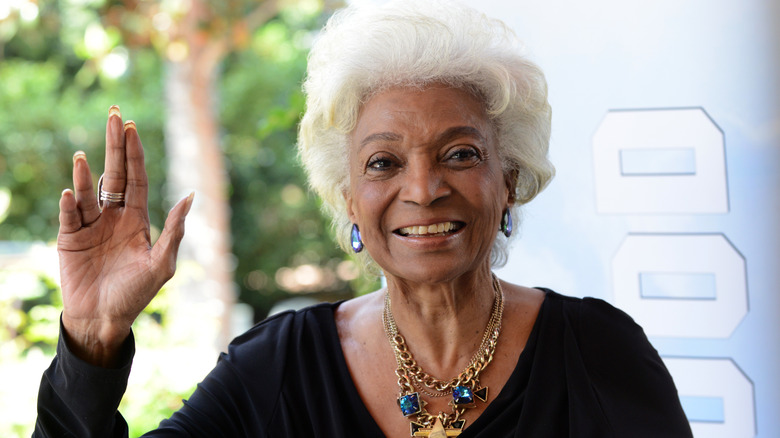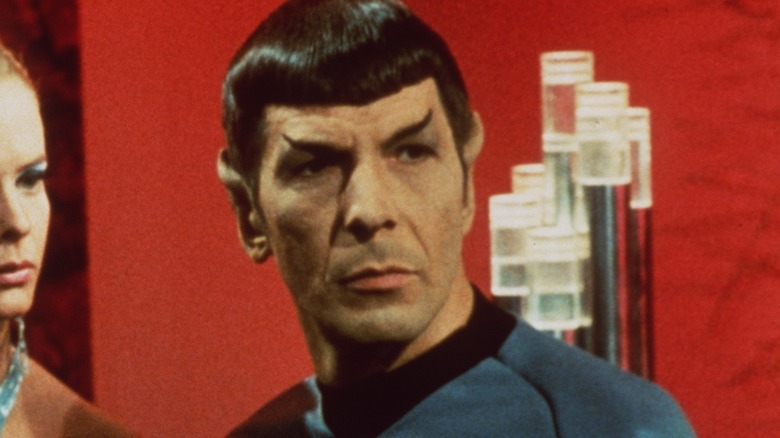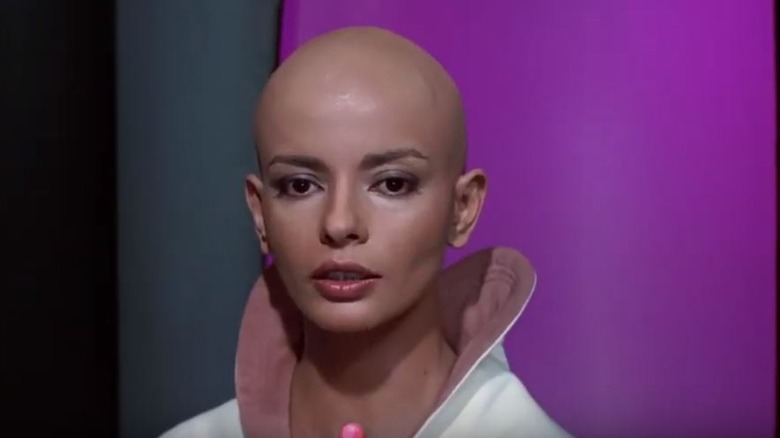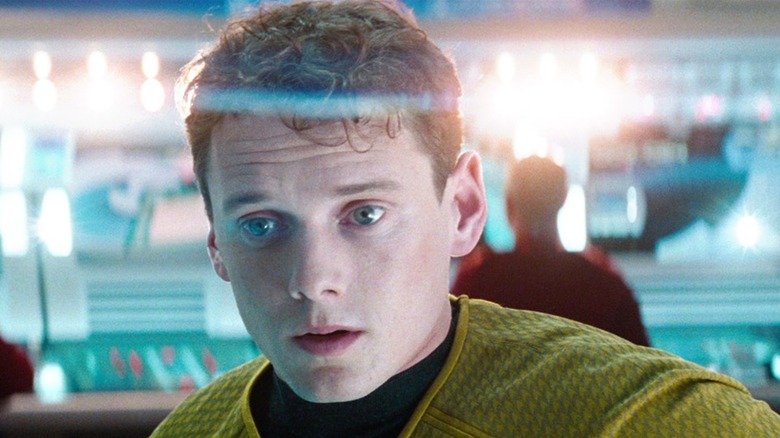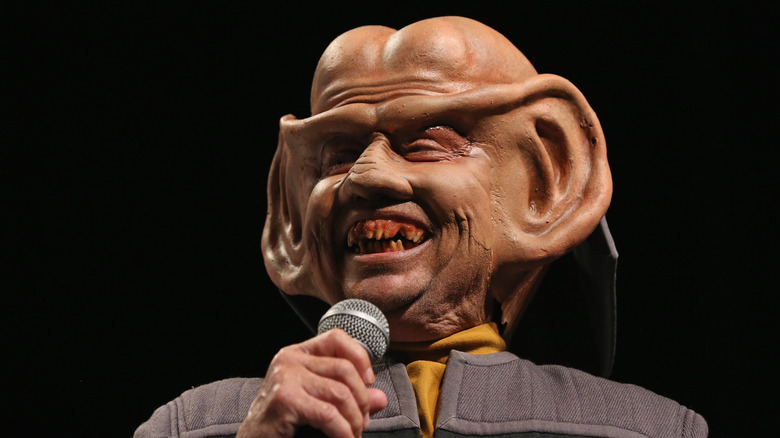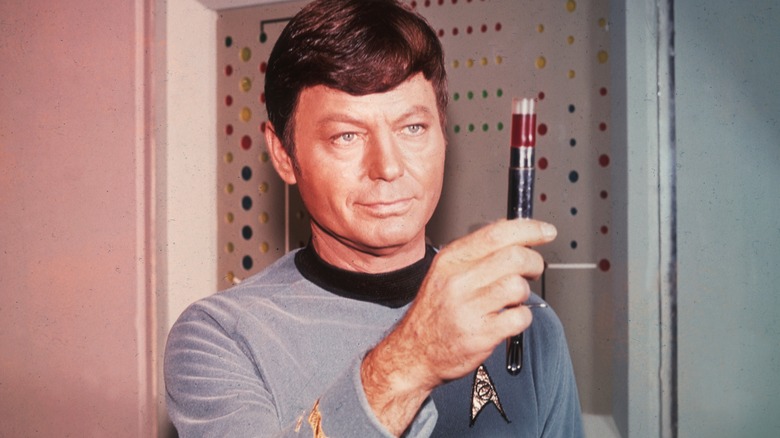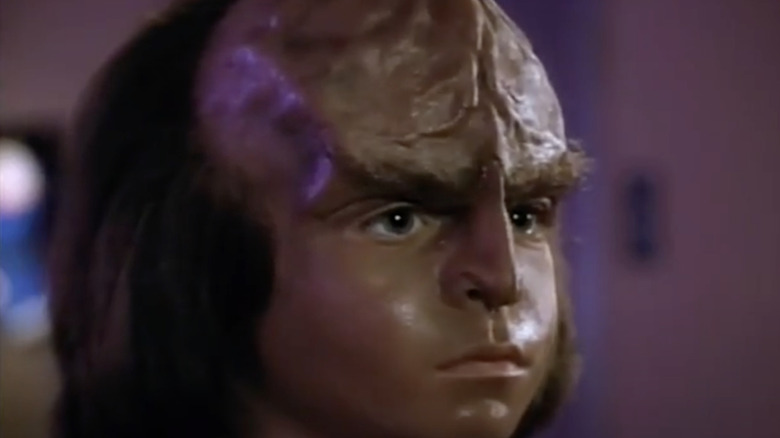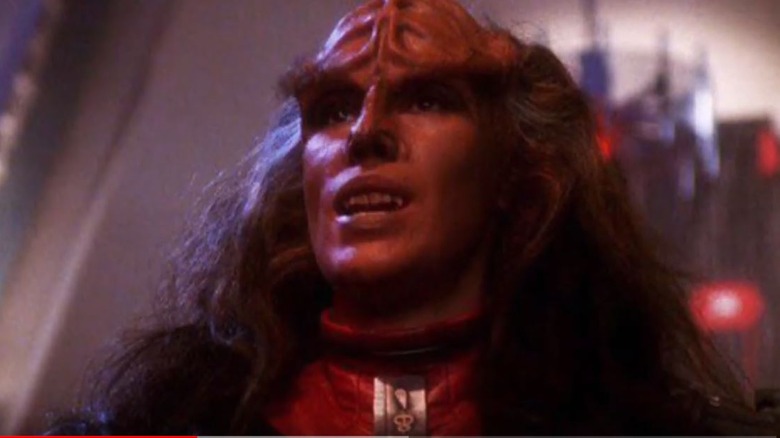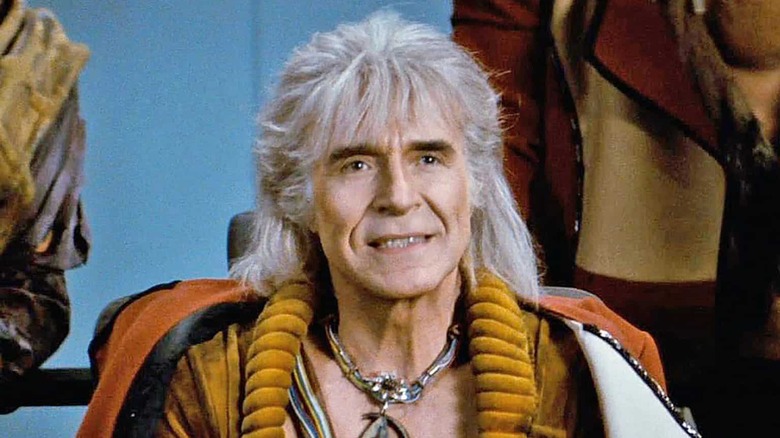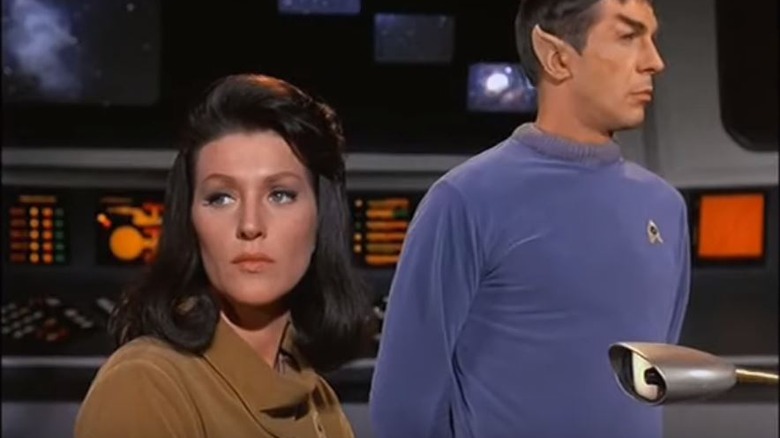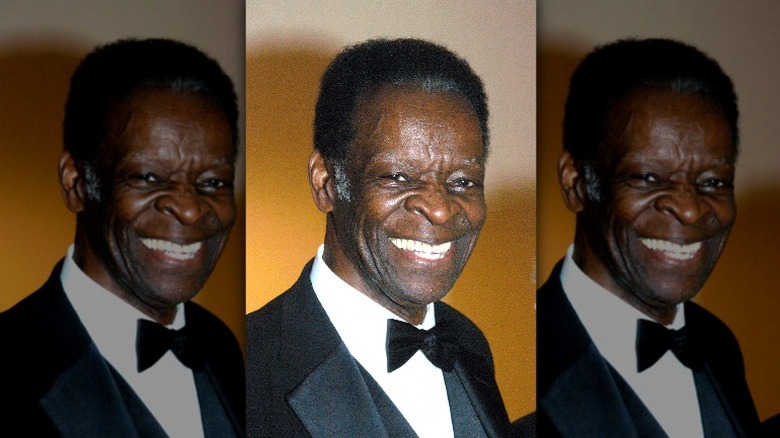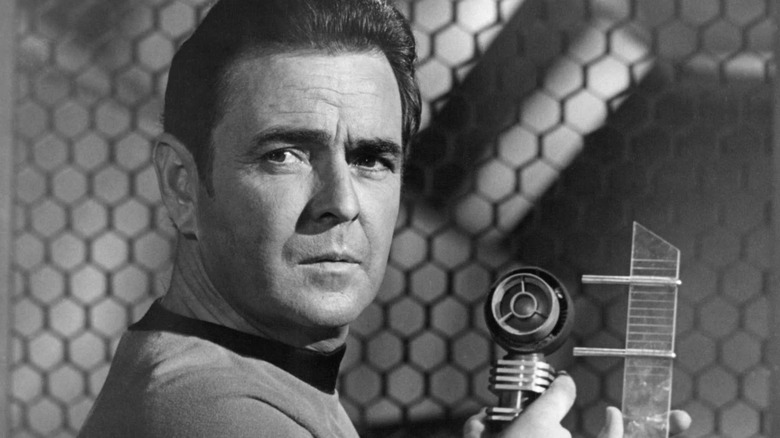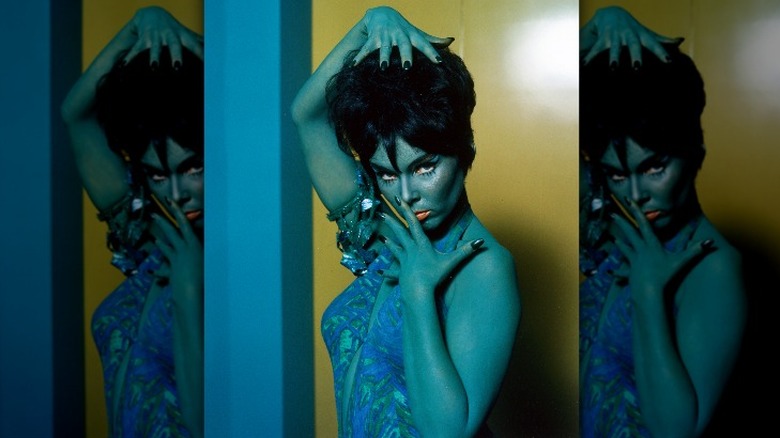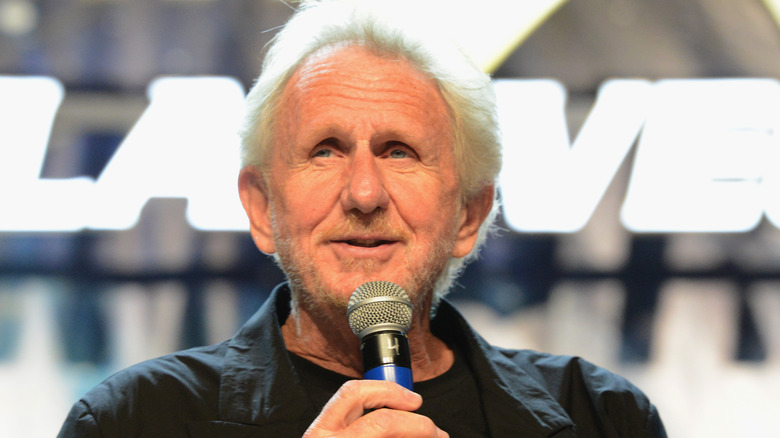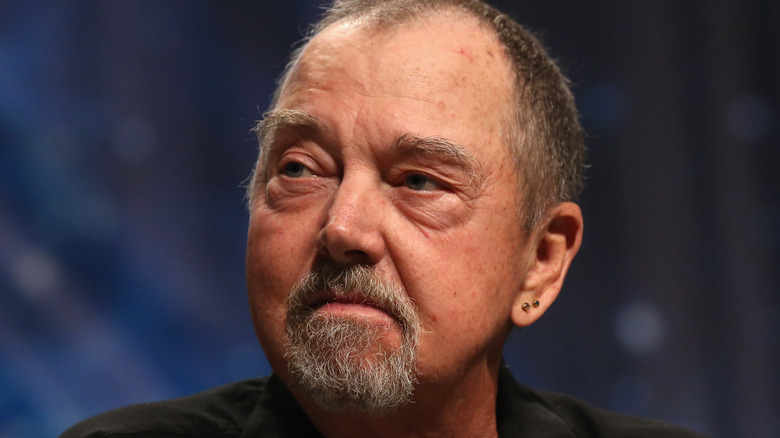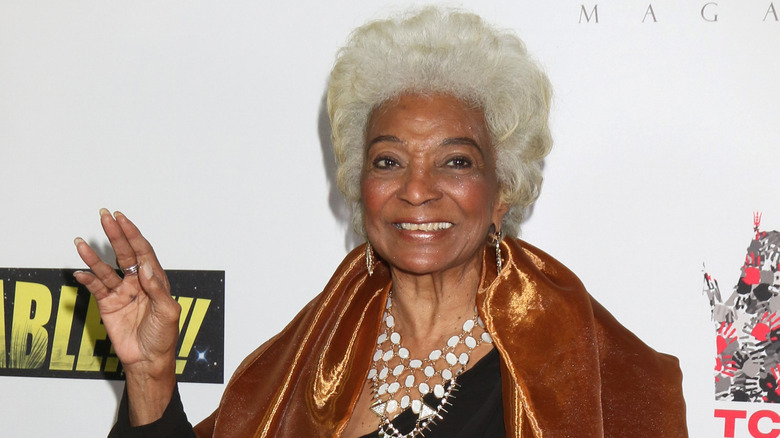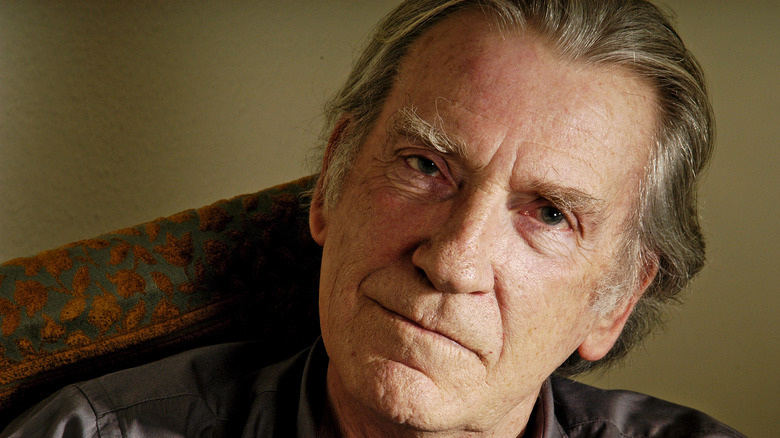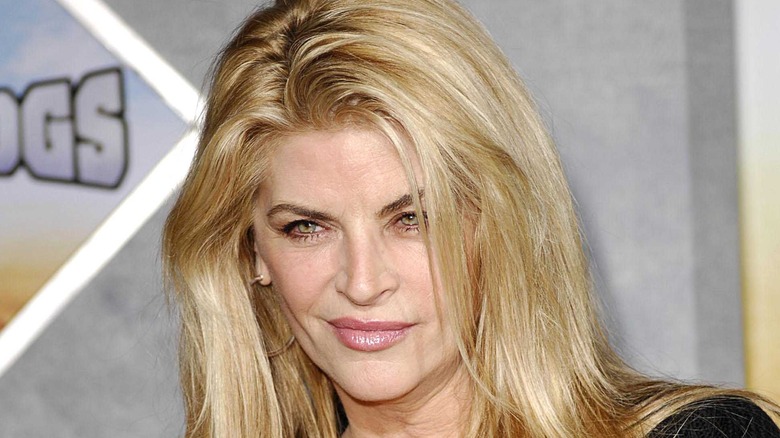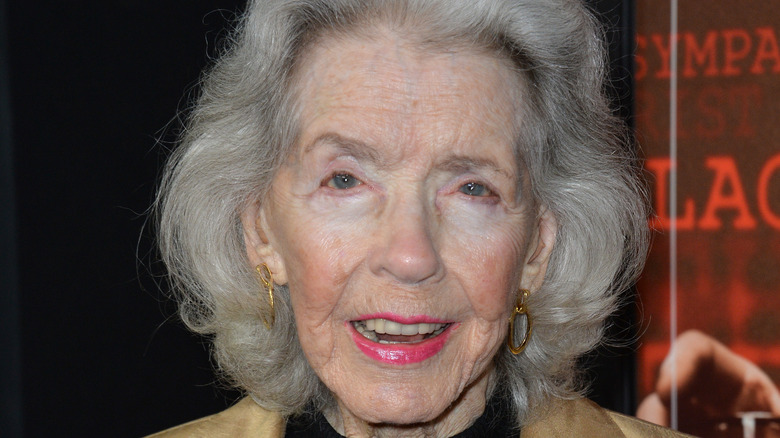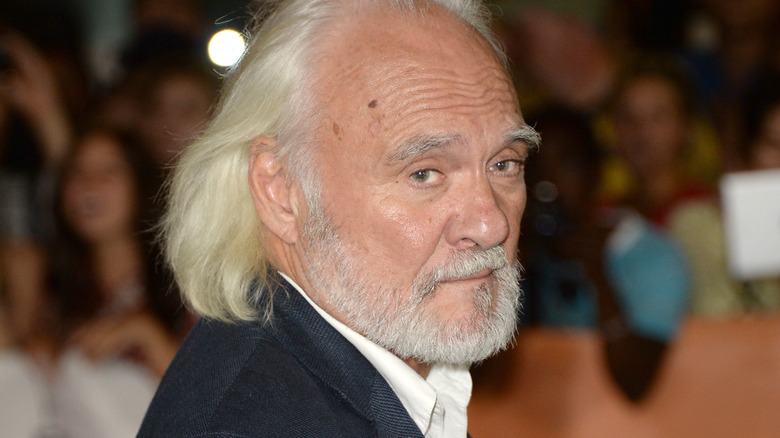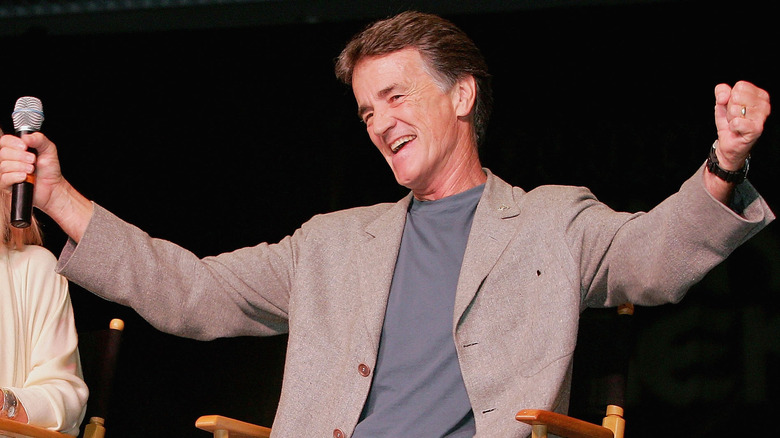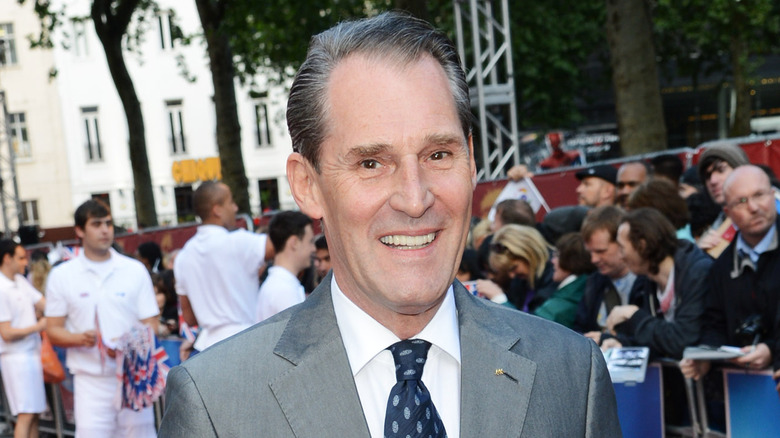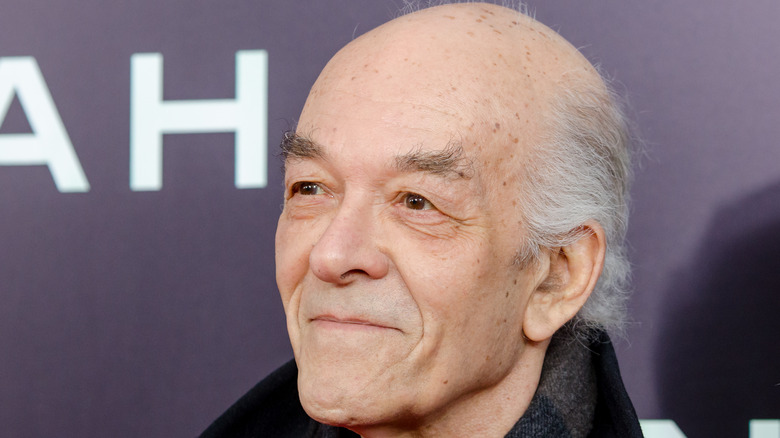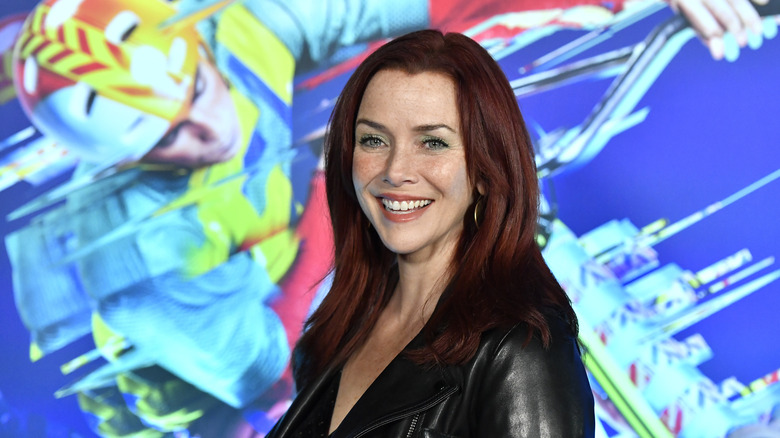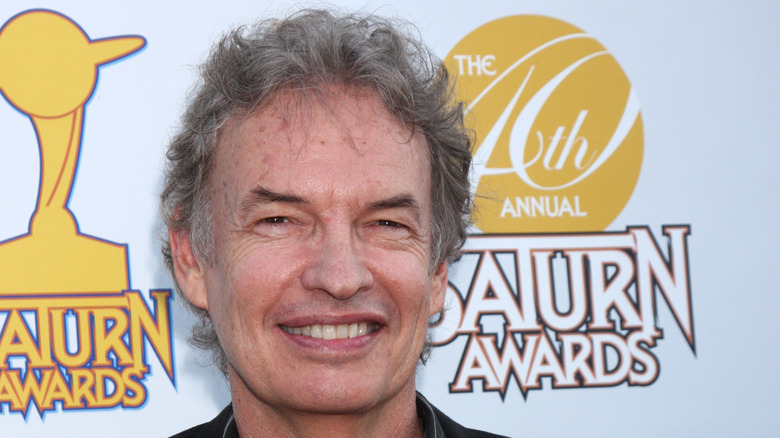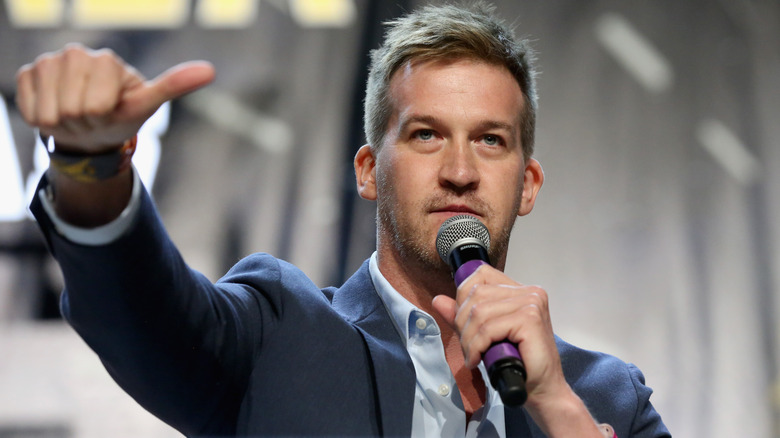Star Trek Actors You Forgot Passed Away
"Star Trek" has been around for more decades than many people have been alive, and despite occasional setbacks, the franchise never truly disappears for long. Gene Roddenberry's vision of utopia first hit TV screens in 1966, and ever since, it has stayed alive through more than 900 episodes, 13 movies, a cartoon, reboots, a complex timeline of events, the development of a fictional language you can actually learn to speak, and — perhaps most beloved of all — hundreds of characters, planets, and cultures spanning the universe.
As the decades have gone on, though, many of the actors who brought these immortal characters to life have reached the end of their own, all-too-mortal lives, to the great sadness of Trekkies everywhere. Some of these deaths you might have heard of over the years. Others could be a depressing surprise. Either way, may the memory of these talented performers live long and prosper.
Leonard Nimoy
Despite a humorless, cold, and "logical" demeanor, Spock is the heart of all things "Star Trek," and much of the credit for that goes to Leonard Nimoy. When not acting, Nimoy was also a poet, an artist, a photographer, and a musician. His relationship with the Spock character could be, at times, complicated. Of his two autobiographies, the first 1975 book was titled "I Am Not Spock," whereas the 1995 follow-up was "I Am Spock." He later described himself as feeling a sort of mystical identification with the intellectual, pointy-eared alien, according to The New York Times, once writing, "In Spock, I finally found the best of both worlds: to be widely accepted in public approval and yet be able to continue to play the insulated alien through the Vulcan character."
To the great sadness of every science-fiction fan in the world, including then-U.S. President Barack Obama, Leonard Nimoy passed away in 2015, at the age of 83. His wife, Susan Bay Nimoy, attributed his death to end-stage chronic pulmonary disease.
During his twilight years, Nimoy continued bringing Spock to life as the elderly "Spock Prime" version of the character in the rebooted "Star Trek" movies. To honor his legacy, the 2016 film "Star Trek Beyond" made a point to write the Vulcan's death into the script and show the impact of his demise on the younger version of the character, played by Zachary Quinto.
Persis Khambatta
Ilia, the Deltan navigator whose encounter with the V'ger entity proved fatal, did not get the chance to become a recurring character, but she nonetheless played a key role in "Star Trek: The Motion Picture." At the time, Ilia's shaved head was a bold statement — she was the first bald heroine in film history — and the daring actress who brought her to life was Persis Khambatta, an international model from Mumbai (formerly Bombay), who in 1965 had been awarded the title of Miss India.
Khambatta entered the acting world through an array of Hindi-language films before making her Hollywood debut in the 1975 flick "The Wilby Conspiracy," co-starring Sidney Poitier and Michael Caine. Playing Ilia in "Star Trek" proved to be her breakout performance, eventually leading to a role in history as the first-ever Indian performer to present an award at the Oscars. However, when she was offered a role in the next James Bond movie, she rejected it, out of a vow to her mother that she would return home.
Throughout her life and career, Khambatta remained a private individual who did not seek out the spotlight. Sadly, in 1998, she suffered a fatal heart attack that took her life at the young age of 49.
Anton Yelchin
In "Star Trek" history, few deaths have been as tragic — or as horribly unnecessary — as the accidental loss of Anton Yelchin, who portrayed the young genius Pavel Chekov in the reboot films. The Russian-born actor, known for the boyish charm and quick wit shown in films like "Odd Thomas" and "Charlie Bartlett," seemed destined for a long career. Sadly, it all ended in 2016, when a freak car accident ended his life at the terribly young age of 27.
The circumstances involved Yelchin's 2015 Jeep Grand Cherokee bizarrely shifting backward down his driveway without warning. Yelchin was out of the car, and the vehicle trapped his body between his mailbox and security fence, leaving him pinned, crushed, and suffocating until he died. The ensuing legal battle between Fiat Chrysler, the makers of Jeep vehicles, and Yelchin's parents, Victor and Irina, went on for years: The family maintained that the SUV's gear shift mechanism (which had, as it happens, caused dozens of other accidents) was the cause of the young actor's death. These two parties reached a settlement in 2018.
Aron Eisenberg
The Ferengi were some of the funniest characters ever featured on "Star Trek: Deep Space Nine," known for being the greediest capitalists in a galaxy that had mostly abandoned the concept of money. The character of young Nog, though, as played by Aron Eisenberg, proved — in "Star Trek's" patently inspirational fashion — that you can never paint all people of a certain culture with the same brush. Contrary to his latinum-hungry, manipulative uncle Quark, Nog was a boy who formed a genuine friendship with an Earthling, Jake Sisko, and even went on to become the first Ferengi to join Starfleet.
Sadly, while Eisenberg did snag a few other roles over the years, he also suffered through a number of severe health traumas in the decades following his "Star Trek" days. Eisenberg endured two separate kidney transplant operations, with the second one occurring in 2015. Tragically, in late 2019, his wife Malíssa Longo shared on Facebook that Eisenberg had passed away at age 50, saying of her late husband, "He was an intelligent, humble, funny, emphatic soul. He sought to live his life with integrity and truth." Later, she revealed that the cause of death was heart failure.
DeForest Kelley
While Captain Kirk was the go-getter and Spock was the voice of reason, Leonard H. "Bones" McCoy, doctor of the Enterprise, was the dude who wasn't afraid to tell it to you straight, whether you liked it or not. Always ready, always effective, always looking out for the little guy, and never one to back down from a fight, many doctors today have credited Bones with having inspired them to first attend medical school.
Amusingly enough, while it's now impossible to imagine Bones without DeForest Kelley's sarcastic voice attached, Gene Roddenberry initially offered the actor a choice between playing either McCoy or Spock. Hard to imagine, right? In retrospect, Kelley definitely made the right decision. Even after the original series and the first wave of movies, Kelley went on to serve as the bridge between the '60s crew and the then-newcomers featured in "Star Trek: The Next Generation."
The last few years of Kelley's life were plagued by health problems, with his final months spent in a convalescent home in Woodland Hills, California. In 1999, he died at the age of 79, of complications arising from stomach cancer, which he had suffered from for 18 months.
Jon Paul Steuer
Alexander Rozhenko, the son of Worf, was a boy who went through a great deal of change, and was played by multiple actors as he aged from child to adult. The first actor to portray Alexander in "Star Trek: The Next Generation" was a boy named Jon Paul Steuer, who allegedly nabbed the role because he was the only young man capable of sitting still for three hours while all the Klingon makeup and prosthetic pieces were applied. Though Steuer did take a few more roles over the years, he soon decided that acting wasn't his thing, and instead became a successful restaurateur and, most prominently, a musician in the band P.R.O.B.L.E.M.S., where he went by the name Jonny Jewels.
Sadly, on January 1, 2018, Steuer was pronounced dead at the age of 33. The first reports did not reveal the cause, but later that year, The Blast announced his death had been ruled a suicide, as he'd been found with a gunshot wound to the head.
If you or someone you know is struggling or in crisis, help is available. Call or text 988 or chat 988lifeline.org
Barbara March
One of the most underrated duos in "Star Trek" history was Lursa and B'Etor. The two were a pair of villains who, while knowingly corrupt to the core, were hard not to root for as they continually tried to break free of the patriarchal norms in Klingon society. B'Etor was played by Gwynyth Walsh, who would go on to play Chief Examiner Nimira in "Voyager," while Lursa was brought to life by Barbara March. Both actresses were beloved by fans and frequently appeared at conventions.
When March wasn't wearing Klingon makeup, though, she was also a deeply talented, multifaceted artist, who alternated between writing, poetry, and the stage. On the stage, she portrayed characters like Lady Macbeth and the Duchess of Malfi with gusto. Behind the scenes, she scripted plays such as "The Razing of Charlotte Bronte," and novellas like "The Copper People." Sadly, in 2019, March's husband Alan Scarfe posted on Facebook (via ComicBook) that the retired Klingon warrior had passed on to the next realm, at the age of 65, after a long battle with cancer.
Ricardo Montalbán
While everyone remembers the Klingons and the Borg, the most iconic — and powerful — singular antagonist in all of "Star Trek" lore is certainly Khan Noonien Singh, a character who first premiered in the original series before his titular comeback in "Star Trek II: The Wrath of Khan." While Khan's story is interesting and surprisingly sympathetic, the secret ingredient behind the character's enduring popularity was the masterful acting abilities of Ricardo Montalbán.
Montalbán was one of the pioneering Mexican-born actors in Hollywood, who worked hard to overcome the prejudices of his time. When Montalbán achieved his own degree of success, he funneled it into his nonprofit, the Nosotros Foundation, in an effort to create new opportunities in the motion picture business for fellow Latino professionals. He wasn't afraid to call out executives for only casting him in Brazilian, Cuban, and Argentinian roles (or as someone of a Sikh background, in the case of "Star Trek"), but never as a Mexican character, pointing out how the industry continued to portray Mexican people in a stereotypical and negative manner.
Between his passionate activism and his talent, Montalbán left behind an incredible legacy when he died in his Los Angeles home in 2009, at the age of 88. Though the cause of death was originally cited as "old age," it was later revealed to be congestive heart failure.
Majel Barrett Roddenberry
As "Star Trek" diehards will tell you, the show's original pilot episode, "The Cage," was a bit different from the series that eventually came to be. For one, the commander of the Enterprise was not James Kirk, but rather, Christopher Pike. Pike's first officer was a woman called Number One, played by actress Majel Barrett, who was cold, distant, and logical back when Spock was still a smiley, happy-go-lucky dude. However, Number One's high-ranking position on the Enterprise, as well as her calculated demeanor, chafed with NBC producers, so the character was kicked off the bridge.
Since then, both Pike and Number One have become fan-favorite characters, courtesy of their revival on "Star Trek: Discovery," where Rebecca Romijn now portrays the latter. Back then, though, while Barrett's Number One days ended quickly, she did become a major part of "Star Trek" history: not just as the wife (and eventual widow) of creator Gene Roddenberry, but also as the ship's nurse, Christine Chapel, according to the Los Angeles Times. Barrett Roddenberry continued playing Chapel in the movies and later cut loose as Lwaxana Troi on both "Star Trek: The Next Generation" and "Deep Space Nine." Throughout all of this, she also played the familiar voice of the Enterprise computer in various shows.
Majel Barrett Roddenberry passed away in late 2008, at the age of 76, from leukemia.
Brock Peters
Brock Peters was a legendary actor, most recognized for playing a wrongly accused man in the classic "To Kill a Mockingbird." He had many roles over the years, but among "Star Trek" fans, he is remembered for the two unrelated parts he brought to life: First, he portrayed Admiral Cartwright in two of the "Star Trek" movies ("The Voyage Home" and "The Undiscovered Country," to be precise), and second, he entered the world of "Deep Space Nine" as Creole master chef Joseph Sisko, of New Orleans, the father of Avery Brooks' grizzled Captain Benjamin Sisko. Though Peters' "Deep Space Nine" appearances were infrequent, his energy, positivity, and loving dedication to family were a clear influence on his son, a character who has since been ranked by many die-hard Trekkers as their favorite Star Trek captain of all time.
In his later years, Peters came down with pancreatic cancer. The disease finally took his life in 2005, at the age of 78, and he died in his Los Angeles home.
James Doohan
A Scottish engineer named Scotty with a thick Scottish accent? Hey, amusing as it is, that's a piece of "Star Trek" history, and it's hard to imagine the original series working without James Doohan's endearing character manning the transporters. Doohan, who actually hailed from British Columbia, continued playing Scotty all the way through the original series, to the cartoon, to "Star Trek: The Next Generation," where he befriended the new crew in heartwarming fashion. Doohan's lovable persona, tireless enthusiasm, and ability to fix any malady the ship experienced — or loyally beam up his crew mates whenever disaster struck on the planet below — clearly inspired the performances of every "Star Trek" chief engineer since, from Miles O'Brien to Charles "Trip" Tucker III.
Though Doohan lived a long life, his later years were tragically plagued by the onset of Alzheimer's disease. In 2005, he experienced a bout of pneumonia, and he was finally beamed up for the last time at the age of 85.
Yvonne Craig
When you think about Yvonne Craig, the first character that comes to mind is probably Batgirl. And why not? Craig's caped crusader, who was featured in the classic "Batman" show, was one of the most iconic female heroes of the '60s. That said, Craig made guest appearances in quite a number of TV shows at the time, with one of her more memorable roles being in the "Star Trek" episode "Whom Gods Destroy," where she plays Marta, an imprisoned, green-skinned Orion woman.
Marta didn't last long before she was double-crossed and murdered, but the eternal meme of "Captain Kirk seducing a green-skinned alien" was born with this episode. And while that notion is somewhat inaccurate — Marta actually seduces Kirk, and only for the purpose of stabbing him — it has become such a common pop culture reference that even the 2009 reboot had to pay tribute to it.
Acting, though, didn't end up being Craig's lifelong career path. Before playing Batgirl and Marta, she was a professional ballet dancer. Post-Batgirl, she took a surprising career turn and became a real estate broker ... though, in the 2010s, she did turn in a few voice acting performances for kicks. Sadly, this same decade saw her diagnosed with breast cancer, which went on to metastasize to her liver. She died in 2015, at the age of 78.
Rene Auberjonois
Not everyone knew Rene Auberjonois' name, but he was a beloved actor nonetheless. From his role as Father Mulcahy in the original film version of "M*A*S*H," to TV roles in "Benson" and "Boston Legal," to an unforgettable (albeit, short) performance as the villainous chef in Disney's "The Little Mermaid," Auberjonois carved his way into many pop culture phenomenons.
Perhaps none of his roles, though, were as beloved as Odo, the malleable chief security officer of "Deep Space Nine," whom he portrayed for seven wonderful seasons. While Odo's gruff demeanor and shape-changing power immediately positioned him as one of the space station's most offbeat and interesting figures, the more that "Deep Space Nine" peeled back Odo's layers, the more endearing he became. Lonely, loyal to his friends, in love with Major Kira Nerys, and yet hopelessly connected to the sinister Dominion, Odo was the perfect centerpiece for Auberjonois' talents. Looking back, when one remembers what made "DS9" such a unique "Trek" series, Odo comes to mind immediately.
Post-"Trek," this actor never stopped acting, starring in the 2019 comedy film "Raising Buchanan," where he portrayed the 15th U.S. president. Unfortunately, as with so many "Star Trek" stars, his life was finally claimed by cancer — in his case, of the lungs. To the sadness of fans all over the world, Auberjonois was pronounced dead in 2019, at the age of 79.
Gregory Itzin
Though he may have been best known to many viewers as the villainous President Logan in the action series "24," science-fiction fans are probably more familiar with Gregory Itzin's work as a recurring guest star on "Star Trek." Itzin was set to make an appearance in the first season of "Star Trek: The Next Generation," but passed it up for a role on a different show — a career move that he later regretted. However, he must have made an impression, as Itzin would return to the franchise starting in "Star Trek: Deep Space Nine." He wrapped up his fifth "Trek" appearance in "Star Trek: Enterprise" as the ominous mirror-verse figure of Admiral Black.
Beyond his guest spots on "Star Trek," Itzin was seemingly everywhere. He was nominated for a number of prestigious acting awards, including a 1993 Tony Award for his stage work and an Emmy for his work on "24." In fact, if you watched just about any TV in the 1990s and 2000s, chances are you saw him, as Itzin popped up on major series such as "ER," "Quantum Leap," "Friends," and "The Practice." And don't forget his film work, either, which includes credits in "Airplane!" and Steven Spielberg's "Lincoln."
Itzin died on July 7, 2022, after emergency surgery. He was 74 years old.
Nichelle Nichols
Few "Star Trek" characters were as groundbreaking as Lieutenant Uhura, played by Nichelle Nichols. As a child, actor Whoopi Goldberg recalled her great excitement at seeing a Black woman on screen who wasn't pigeonholed into the role of a servant. Nichols' appearance deeply inspired Goldberg, she told "Star Trek" showrunner Gene Roddenberry, according to MAKERS. Goldberg later appeared on "Star Trek: The Next Generation" as the bartender Guinan and became friends with Nichols.
Upon meeting Nichols, civil rights activist Martin Luther King Jr. told her his family loved her work on "Star Trek." When she mentioned she intended to leave the show, King urged her to stay on and show viewers that Black people could be far more than stereotypical servants. Nichols was so struck by the interaction that she told Roddenberry she'd changed her mind, and so stayed with "Star Trek" through the end of the original series and a few film roles (via PBS).
Taking advantage of her sci-fi cred, Nichols began working with NASA in 1977 to encourage women and people of color to sign up as astronauts. NASA credited her for encouraging thousands of diverse astronaut candidates, including the first American woman in space, Sally Ride, and future NASA head Charles Bolden. After a long career that also included roles on Broadway and TV, she died of heart failure on July 30, 2022, aged 89.
David Warner
If you're looking for a truly terrifying "Star Trek" villain, look no further than Gul Madred. As seen in the "Star Trek: The Next Generation” two-parter "Chain of Command," Madred is in charge of torturing a captured Captain Picard. But the menace here doesn't come from loud shouting, sudden movements, or other theatrics. Instead, actor David Warner chills you to the bone while mostly sitting behind a desk. It's a testament to Warner's towering talent that he put on display throughout a long and storied career.
If you pay attention, you'll find that Warner popped up multiple times throughout the "Star Trek" franchise. Besides the bone-chilling Gul Madred, he was in 1989's "Star Trek V: The Final Frontier" as ambassador St. John Talbot, and in the better-received "Star Trek VI: The Undiscovered Country" as the Klingon Chancellor Gorkon (who may also be a sci-fi analog to Soviet president Mikhail Gorbachev).
But Warner was a pretty big deal outside of sci-fi circles. By the time he died on July 24, 2022, at age 80, of complications from cancer, his resume was both long and impressive. Ever watched "Titanic?" There was Warner, as the devious Spicer Lovejoy. He was also the doomed Keith Jennings in the classic horror film "The Omen," and played the villain in 1982's "Tron." Meanwhile, he also graced the stage in a number of productions by the Royal Shakespeare Company, including major roles as Henry VI and Hamlet.
Kirstie Alley
Though she was only part of "Star Trek" for a single movie — and in just one role, at that — Kirstie Alley has an enduring legacy as a major part of the franchise. That's because she played Lieutenant Saavik, the new Vulcan officer who debuted in 1982's "Star Trek II: The Wrath of Khan." Director Nicholas Meyer told People that he was struck by the young actor's talent and dedication to the role, to the point where he fought for her casting despite Alley's then very spare experience.
Yet Alley declined to return as Saavik in further films. As she told StarTrek.com, the reasoning behind her decision was simple, if a bit painful: The filmmakers just didn't offer her enough money. In fact, as she recalled, Alley was offered less money for what would have been a more involved role in 1984's "Star Trek III: The Search for Spock."
Though many undoubtedly wished they could have seen more of Alley's striking and evocative "Star Trek" character, she went on to a long and storied career in plenty of other films and TV shows. She appeared on the small screen as Rebecca Howe on the mega-hit sitcom "Cheers," which earned her an Emmy. She also appeared in films such as "Look Who's Talking" as the mother of an infant voiced by Bruce Willis, and the mockumentary "Drop Dead Gorgeous." She died of cancer on December 5, 2022, at age 71.
Marsha Hunt
At the time of her death on September 7, 2022, Marsha Hunt was referred to in many obituaries as the oldest living "Star Trek" actor. Deservedly so, as she made it to age 104. Among "Star Trek" fans, she was remembered for her role as Anne Jameson, wife of Admiral Mark Jameson in the "Star Trek: The Next Generation" episode "Too Short a Season." There, she watches as her husband de-ages due to an alien wonder drug.
Marsha Hunt deserves far more recognition for her life and work than she may have gotten for playing a beleaguered space wife. She began as a prolific actor in early Hollywood, but she ran afoul of the House Un-American Activities Committee. Though Hunt only ever protested the committee and was never a known Communist, her refusal to apologize for supporting civil liberties put her squarely on the blacklist.
Though her career later picked back up on television, Hunt took the lull as an opportunity to travel and become more socially engaged. She eventually became an activist who supported the World Health Organization, defended refugees, and helped support unhoused people. Toward the end of her life, she steadfastly maintained that she had been right to follow the dictates of her conscience, both in going up against the House Un-American Activities Committee and more broadly in her activist work.
Kenneth Welsh
Kenneth Welsh made his "Star Trek" debut rather late in his career, popping up in Season 3 of "Star Trek: Discovery" as Admiral Senna Tal, as noted by fellow "Star Trek" actor Patrick Kwok-Choon on Twitter. Kwok-Choon fondly recalled Welsh's intelligence and humor while the two worked together on a 2009 play. On "Discovery," Welsh's Admiral Tal was part of a significant storyline involving a Trill symbiont species and some possible surprises about Starfleet.
Welsh, who died of cancer on May 5, 2022, at age 80, was also well remembered for his villainous turn on David Lynch's "Twin Peaks." He played former FBI agent Earle, who spends a fair amount of time menacing current agent Dale Cooper (Kyle MacLachlan). But Welsh wasn't just restricted to sci-fi genres or the horror-soap opera mashup of "Twin Peaks." For history nerds, he played President Truman on two occasions and Thomas Edison once. He showed up in multiple comedy series and kid-friendly films, as well as in a role as the U.S. vice president in the disaster flick "The Day After Tomorrow." He also spent a great amount of time on stage and especially in Canadian productions, such as at the Shakespeare-centric Stratford Festival.
Robert Walker Jr.
Though Robert Walker Jr. only made one appearance in the very first season of the very first "Star Trek" series, it's hard to forget him. That's because Walker played the titular character in the show's second episode, "Charlie X." Young Charlie was an isolated teenager picked up by the crew of the Enterprise. This being "Star Trek," he's no ordinary teen: Instead, Charlie starts to wreak havoc with some seriously frightening, quasi-supernatural powers, emphasized with extra-dramatic lighting effects.
Walker, who died at age 79 on December 5, 2019, also appeared in 1969's "Easy Rider" and a slew of classic TV shows over the decades after his "Star Trek" appearance, including spots on "Bonanza," "The Six Million Dollar Man," and "Columbo." Perhaps he had something of a leg up in the acting world, given that both of his parents — Robert Walker and Jennifer Jones — were actors. What's more, after their divorce, Jones remarried, this time to mega-big-deal producer, screenwriter, and film exec David O. Selznick.
Ben Cross
With the big franchise reboot of "Star Trek" in 2009, many of the core roles were necessarily recast. Sure, Leonard Nimoy made a very special guest appearance thanks to some timeline shenanigans, but it was clear that his casting was the exception rather than the rule. Kirk, McCoy, Spock, Scotty ... you name the character, and they were recast.
That was certainly true for the role of Sarek, Spock's stern Vulcan father. Played by Mark Lenard in the original series, Sarek was embodied again in the reboot by British actor Ben Cross. Besides stepping into the role of one of the most Vulcan of all known Vulcans in the whole franchise, Cross also co-starred in 1981's "Chariots of Fire." Before that, he joined the Royal Academy of Dramatic Art and eventually made waves as a stage actor, joining the companies of West End musicals like the London production of "Chicago." He died of cancer at age 72 on August 18, 2020.
Mark Margolis
Mark Margolis may have only been on one episode of "Star Trek," but it certainly was memorable. He played Doctor Nel Apgar, the prickly head of a research station featured in "A Matter of Perspective," from Season 3 of "Star Trek: The Next Generation." Apgar's maybe-accidental, maybe-intentional death kicks off the story, which sees Commander Riker accused of his murder and a "Rashomon"-style retelling of the incident from different perspectives. In the ensuing investigation, a holographic version of Apgar plays out those various accounts, though he's hardly cuddly in even the most sympathetic takes. Oh, and he may have tried to murder Riker — that's hardly going to win points with "Star Trek" fans.
Maybe this isn't the most lauded story in all of "Star Trek," but it's hard to deny the appeal of the guest actors on the episode, especially Margolis. Even if he didn't generate huge buzz from that 1990 appearance, he definitely garnered attention in his later career. Margolis went on to play quasi-retired drug lord Hector Salamanca in "Breaking Bad" and its mostly-prequel spinoff series "Better Call Saul." His work was all the more notable because his character had lost the ability to speak by "Breaking Bad." If that somehow wasn't enough of a credit, he also appeared in "Scarface," "Ace Ventura: Pet Detective" (as Ventura's chilling, rent-seeking landlord), "Noah," and "Black Swan," among many other projects. Aged 83, he died in New York City on August 3, 2023, after a brief illness.
Annie Wersching
Fans of "Star Trek" are most likely to know of Annie Wersching from her striking turn in 2022 as the menacing yet isolated Borg Queen, in Season 2 of "Star Trek: Picard." Yet this wasn't her first stint as part of the sci-fi franchise, as Wersching first joined "Star Trek" as Liana in a 2002 episode of "Star Trek: Enterprise." As she told Star Trek Explorer in 2022, that was her introduction to "Star Trek," though she admitted to being more of a "Quantum Leap" fan as a child. But after being cast as the Borg Queen in late 2020, she dove into the Borg lore of the series and the work of previous Borg Queen actors Alice Krige and Susanna Thompson before making her own mark in the role.
Wersching died of an unspecified form of cancer on January 29, 2023. Besides "Star Trek," Wersching was an established actor with credits on major series like "Bosch," "24," "The Vampire Diaries," and "The Rookie." She was also the voice actor for Tess, the hard-bitten and ultimately doomed partner of Joel in the hit 2013 video game "The Last of Us."
Gary Graham
"Star Trek" fans will recognize Gary Graham as the actor who played Soval, the Vulcan ambassador to Earth who appeared in "Star Trek: Enterprise," as well as from another one-off role as Tanis in an episode of "Star Trek: Voyager." For those who want to show off some true nerd cred, they might also point to his appearances in fan works as First Officer Ragnar in 2007's "Star Trek: Of Gods and Men" and "Star Trek: Renegades" (2015-2017).
He was also a prominent figure in the "Alien Nation" TV series that aired from 1989 to 1990, playing human detective Matthew Sikes, who solved mysteries alongside a marginalized extraterrestrial refugee. The franchise was successful enough that Graham reappeared as Sikes in five follow-up films in the "Alien Nation" franchise. He also appeared in shows like "The Dukes of Hazzard" and "Starsky and Hutch." Graham was still acting when his ex-wife Susan Lavelle announced his death on Facebook on January 23, 2024. Though she did not mention the cause of the 73-year-old Graham's death, she spoke fondly of his acting work and his devotion to being a father to their daughter. His current wife, Becky, told The Hollywood Reporter that he died of cardiac arrest while in a hospital in Spokane, Washington.
Kenneth Mitchell
In 2020, "Star Trek: Discovery" actor Kenneth Mitchell sat down with People for a very difficult interview. In it, he revealed that he had been given some shocking news in 2018: The chronic pain that he had been suffering from wasn't the pinched nerve he suspected, but the progressive, incurable, and fatal condition amyotrophic lateral sclerosis (ALS). The prognosis with ALS is bleak, typically fatal within five years, and is characterized by a slow loss of voluntary and involuntary movements, usually culminating in respiratory failure.
Mitchell recalled: "The moment that they told us it was [ALS], it was like I was in my own movie. That's what it felt like, like I was watching that scene where someone is being told that they have a terminal illness. It was just a complete disbelief, a shock." He went on to say that it changed everything, and they concentrated on spending as much time together as they could.
His family shared news of his death on February 24, 2024, five and a half years after his diagnosis. The Instagram post was accompanied by a photo of Mitchell with his two children, all smiles. And that's important. When talking about how he was dealing with a terminal diagnosis, he credited his "Star Trek" costars for telling him, "You have a choice. You can look at this in many different ways but maybe try to look at this like a gift where you get to experience life in a way that most people don't."
